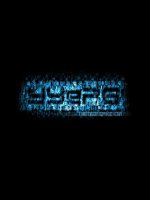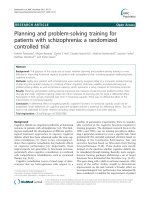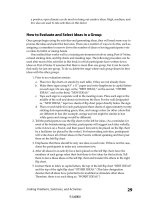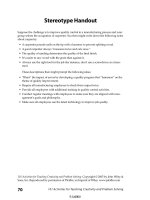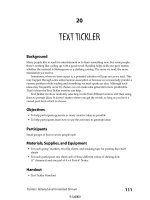Information Sources and Problem Solving
Bạn đang xem bản rút gọn của tài liệu. Xem và tải ngay bản đầy đủ của tài liệu tại đây (196.73 KB, 12 trang )
Systems Administration Chapter 3: Information Sources and Problem Solving
Page 54
Chapter
Information Sources and Problem Solving
Introduction
As a Systems Administrator you will be expected to fix any and all problems that
occur with the computer systems under your control. There is no way that this book
or this course can prepare you for every situation and problem you will come across.
Additionally, for most of us mere mortals it is simply not possible for us to know
everything that is required. Instead as a Systems Administrator you must know the
important facts and be able to quickly discover any new information that you don't yet
know. You must be able to diagnose and solve the problem even though you have
never seen it before.
This chapter examines the sources of information that a Systems Administrator might
find useful including professional associations, books, magazines, and the Internet. It
also provides some guidelines about how you might go about solving problems you
have never seen before. While some of this information is Linux specific most of it is
applicable to any operating system.
As the semester progresses you should become familiar with and use most of the
information sources and the problem solving process presented here.
Other resources
This chapter mentions a large number of Internet resources and includes the URLs.
You can find an up-to-date listing of these links and other related links on the Links
database on the course website.
Other resources that are related to this chapter include:
· Online lecture 2 on the course website
· HOWTO’s
Online Troubleshooting Resources HOW-TO, Reading List HOW-TO and the
Staying Updated mini-HOW-TO.
Information sources
The following sections first examine the range of information sources you have
available as a Systems Administrator. Each of the following sections deals with a
different type of resource. As a trainee Systems Administrator you should find
yourself starting to use these resources during your study. Learning how to answer
your own questions is perhaps the most important thing you can take from this text.
The information sources discussed in the following includes:
· Professional associations
There are quite a diverse list of professional associations available which may be
useful to a Systems Administrator.
Systems Administration Chapter 3: Information Sources and Problem Solving
Page 55
· Books and magazines
There are now a wide range of relevant books and magazines to chose from.
· Internet sources
The Internet is perhaps the most comprehensive and up-to-date resource for
Systems Administrators, if used correctly.
Professional organisations
Belonging to a professional organisation can offer a number of benefits including
recognition of your abilities, opportunities to talk with other people in jobs similar to
yours and a variety of other benefits. Most professional organisations distribute
newsletters; hold conferences and many today have mailing lists and web sites. All of
these can help you perform your job.
Professional organisations a Systems Administrator might find interesting include:
· Systems Administrators Guild of Australia (SAGE-AU, e-
au.org.au/)
· Systems Administrators Guild (SAGE) (the American version of SAGE-AU,
· Australian UNIX Users Group (AUUG,
· Australian Computer Society (ACS,
· Usenix (
· Internet Society of Australia (
This list has a distinct Australian, UNIX, Internet flavour with just a touch of the USA
thrown in. If anyone from overseas or from other factions in the computer industry
(i.e. Novell, Microsoft) has a professional organisation that should be added to this list
please let your course lecturer know.
The UNIX Guru Universe (UGU is a website which provides a
huge range of pointers to UNIX related material. It will be used throughout this
chapter and in some of the other chapters in the text.
Professional Associations
The Resource Materials section on the course website for week 1 has a page which
contains links to professional associations and user organisations.
The SAGE groups
SAGE stands for Systems Administrators Guild and is the name taken on by a number
of professional societies for Systems Administrators that developed during the early
90s. There are national SAGE groups in the United States, Australia and the United
Kingdom.
Sage-au
The Australian SAGE group was started in 1993. SAGE-AU holds an annual
conference and distributes a bi-monthly newsletter. SAGE-AU is not restricted to
UNIX Systems Administrators.
Both SAGE and SAGE-AU have a presence on the web. The Professional
Associations page on the course website contains pointers to both.
Systems Administration Chapter 3: Information Sources and Problem Solving
Page 56
UNIX User groups
There are various UNIX user groups spread throughout the world. AUUG is the
Australian UNIX Users Group and provides information of all types on both UNIX
and Open Systems. Usenix was one of the first UNIX user groups anywhere and is
based in the United States. The American SAGE group grew out of the Usenix
Association.
Both Usenix ( and AUUG ( have
web sites. Both sites have copies of material from the associations’ newsletters.
It should be noted that both user groups have gone beyond their original UNIX
emphasis. This is especially true for Usenix, which runs two important
symposiums/conferences on the various versions of Windows NT based operating
systems.
The ACS, ACM and IEEE
The ACS is the main professional computing society in Australia servicing people
from all computing disciplines. The flavour of the ACS is much more business
oriented than SAGE-AU.
The ACS is also moving towards some form of certification of computing
professionals and some jobs may require ACS membership.
For more information refer to the web page (
The Association for Computing Machinery (ACM, is one of the
largest American professional computing societies. Its publications are considerably
more technical and wide ranging than the ACS.
The Institute for Electrical and Electronics Engineers (IEEE,
also has a Computing Society (
Books and magazines
When a new computing person asks a technical question, a common response will be
“RTFM”. RTFM stands for Read The Fine (and other words starting with f) Manual
and implies that the person asking the question should go away and look at
documentation for the answer.
Around five years ago RTFM for a Systems Administrator meant reading the on-line
man pages, some badly written manual from the vendor or maybe, if lucky, a Usenet
newsgroup or two. Trying to find a book that explained how to use
cron
or how to set
up NFS was a difficult task.
Since then there has been an explosion in the number of books and magazines that
cover Systems Administration and related fields. This is especially noticeable over
the last couple of years with the huge hype surrounding Linux and Open Source
software. The following pages contain pointers to a number of different
bibliographies that list books that may be useful.
A Linux specific "magazine" which anyone with access to the 85321 course CD-
ROM/website (or to the Linux Documentation Project:
can read is the Linux Gazette.
Systems Administration Chapter 3: Information Sources and Problem Solving
Page 57
Bibliographies
UNIX, Systems Administration and related books.
The Resource Materials section for week 1, on the course website or CD-ROM, has a
collection of pointers to books useful for this course and System Administration in
general.
O'Reilly books
Over the last few years there has been an increase in the number of publishers
producing UNIX, Systems Administration and network related texts. However one
publisher has been in this game for quite some time and has earned a deserved
reputation for producing quality books.
A standard component of the personal library for many Systems Administrators is a
collection of O'Reilly books. For more information have a look at the O’Reilly web
site (
Magazines
There is now a wide range of magazines dealing with all sorts of Systems
Administration related issues, including many covering Windows operating systems.
Magazines
The course website contains pointers to related magazines under the Resource
Materials section for week 1.
Internet resources
The Internet is by far the largest repository of information for computing people
today. This is especially true when it comes to UNIX and Linux related material.
UNIX was an essential part of the development of the Internet, while Linux could not
have been developed without the ease of communication made possible by the
Internet. If you have a question, a problem, need an update for some software, want a
complete operating system or just want to have a laugh, the Internet should be one of
the first places you look as a Systems Administrator.
So what is out there that could be of use to you? You can find:
· software
· discussion forums
· information
Each of these is introduced in more detail in the following sections.
The course website
The course website contains mirrors, pointers and other resources related to some of
the Internet related material discussed below. These resources include:
· a link database
Chances are the links listed here will become out of date. The website maintains a
database of Linux and Systems Administration related links which include ratings.
You can add links to this database.
Systems Administration Chapter 3: Information Sources and Problem Solving
Page 58
· a FAQ database
The LDP and most newsgroups maintain lists of common questions (with
answers). This database allows you to quickly search and view these questions.
· The Google search engine () can be searched directly from
the website.
How to use the Internet
By this stage it is assumed that you should be a fairly competent user of the Internet,
the web, email, Usenet news and other net-based resources. If you are a little rusty or
haven’t been introduced to many of these tools there are a large number of tutorials on
the Internet that provide a good introduction. A good list of these tutorials is held on
the Google site (
Software on the Internet
There is a large amount of "free" UNIX software available on the Internet. It should
be kept in mind that no software is free. You may not pay anything to get the software
but you still have to take the time to install it, learn how to use it and maintain it.
Time is money.
Many variants of “public-domain” software are available on the Internet. These
projects are usually open source, meaning that the source code is supplied with the
program. Inspection, alteration and general fiddling with the workings of a program
can be achieved and are encouraged with the idea that a better product will emerge.
GNU software (GNU is a “recursive acronym” that stands for “GNU's Not UNIX”) is
probably the best-known public domain software on the Internet. Much of the
software, for example
ls,
cd
and the other basic commands that come with Linux, is
GNU software. In fact there is a trend amongst some people to call Linux,
GNU/Linux, to reflect the amount of GNU software a Linux distribution uses.
The Gnu Manifesto
A copy of the GNU manifesto is available on the course website and CD-ROM under
the Resource Materials section for this week.
The GNU website ( contains a lot more information about GNU's
projects and licensing details.
A good place to go to get the latest Open Source software (if you are based in
Australia) is the AARNet mirror ( or
It contains mirrors of a lot of popular Open Source
software including GIMP, MySQL, PHP, Perl, Linux, Apache and KDE.
Discussion forums
Probably the biggest advantage the Internet provides is the ability for you to
communicate with other people who are doing the same task. Systems
Administration is often a lonely job where you are one of the few people, or the only
one, doing the task. The ability to share the experience and knowledge of other
people is a great benefit.
Major discussion forums on the web include:
· Usenet news
· mailing lists
· web based forums




